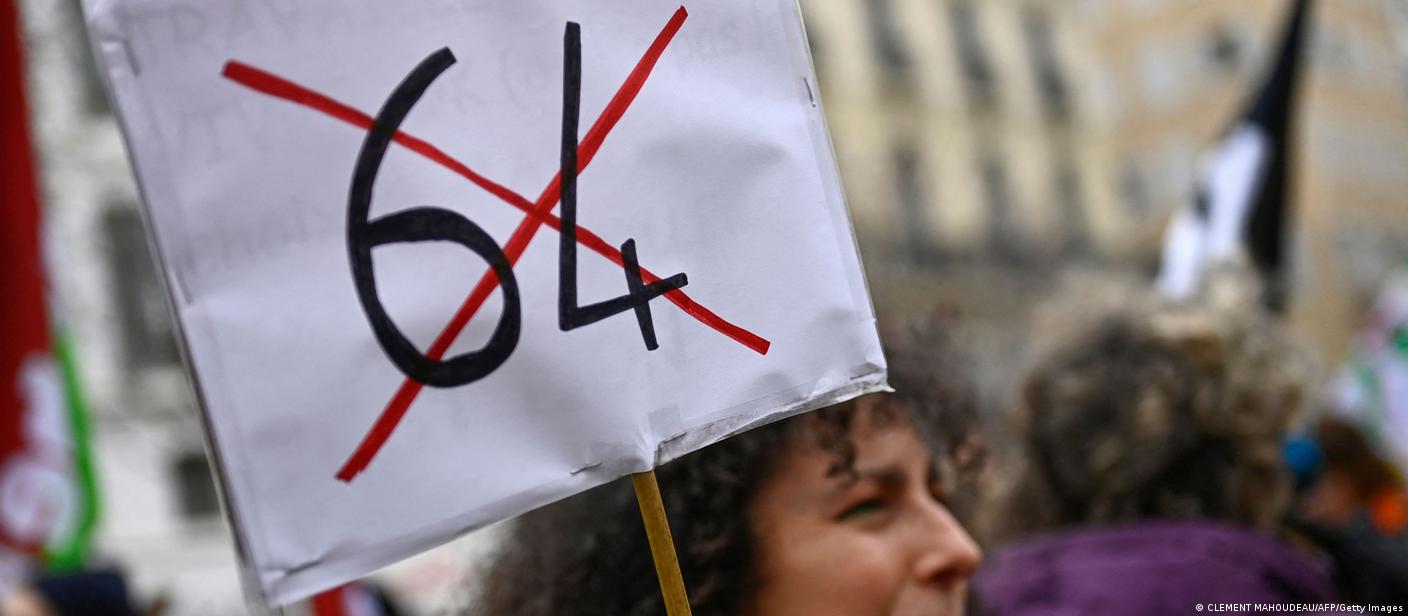POLITICSFRANCE
France: Paris police ban protests near parliament
4 hours ago4 hours ago
Two nights of violence in central Paris spurred the protest ban. Workers are incensed after President Macron dodged a parliamentary vote on raising the retirement age to 64.
https://p.dw.com/p/4Ot0R
Police in France on Saturday banned protests opposite the National Assembly in Paris following a second night of violence over the government’s ducking of a parliamentary vote on unpopular pension reforms.
President Emmanuel Macron’s overhaul will raise the standard retirement age by two years to 64, which the government says is essential to ensure the system does not go bust.
After the government approved the plan by decree on Thursday, bypassing the lower house of parliament, rival opposition parties filed two separate no-confidence motions, which are due to be debated on Monday afternoon but which are also expected to fail.
Why have police banned protests?
Paris police said the ban around Place de la Concorde, opposite the National Assembly building, as well as the city’s famous shopping street Champs Elysees, was ordered because of “serious risks of disturbances to public order.”
Spontaneous gatherings near parliament on Thursday and Friday evenings had led to clashes between some protesters and security forces, including hundreds of arrests.
French protest against Macron’s pension reforms
01:46
Police used tear gas and water cannon to disperse demonstrators and at one point on Friday, an angry crowd tossed an effigy of Macron into a bonfire to cheers from others.
Paris wasn’t the only French city to witness violence in opposition to the pension reform. In the southeastern city of Lyon, demonstrators tried to break into a town hall and set fire to the building. More than 30 people were arrested.
What next for the protest movement?
The hope for calm in Paris on Saturday was short-lived. Dozens of students and activists marched through the Forum des Halles shopping mall, chanting loudly and letting off red smoke.
Unions said they would instead hold the main Paris protest at Place d’Italie from around 6 p.m. local time (1700 GMT).
Mostly peaceful marches took place in several other French cities, including Marseille, Montpellier and Nantes — where one placard read “Death to the king,” seemingly in reference to Macron.
People attend a demonstration against France’s pension reforms in Nantes, France, on March 18, 2023People attend a demonstration against France’s pension reforms in Nantes, France, on March 18, 2023
Workers continued protests in several cities over the government’s handling of pension reformsImage: STEPHANE MAHE/REUTERS
“We’re fed up,” Ariane Laget, who joined a protest in the small southern town of Lodeve, told French news agency AFP. “We feel like we’re being trampled on and no one is listening.”
A broad alliance of France’s main unions has said it would continue to mobilize members to try to force a U-turn on the changes.
Some unions ordered workers to continue their rolling strikes, severely affecting high-speed and regional rail services this weekend, among other services.
Paris’ municipal rubbish collectors have kept up their action, and by Friday an estimated 10,000 tons of trash were left festering in the streets.
Some French airports will see almost a third of flights canceled on Monday as a result of walkouts, union leaders predicted.
The CGT union said its members had shut down the TotalEnergies oil refinery in Normandy on Friday evening. A similar blockade of a refinery in southern France began earlier in the day.
A day of nationwide industrial action is also scheduled for Thursday — the ninth since mid-January.
Public hostility not enough to quash plans
Opposition to the pension reform was already high, with two-thirds of the French population against the plan, according to polls.
But the sudden move to avoid a parliamentary vote, invoking the controversial article 49.3 of the constitution, caused not only public outrage but also criticism among the political class.
French government forces through pension reform
01:54
In parliament next week, opposition lawmakers hope to garner enough support to topple the cabinet in the no-confidence votes and repeal the law.
But Prime Minister Elisabeth Borne’s cabinet is largely expected to survive.
The motion would need backing from around half the group of opposition right-wing Republicans, a scenario seen as highly improbable. They would also need the shared support of the powerful extreme left and extreme right factions in the National Assembly.
Macron put the pension reforms at the center of his re-election campaign last year.
While his government argued France needed to fall in line with its European neighbors where the retirement age is typically higher, critics say the changes are unfair to people who work from a young age in physically tough jobs and women who interrupt their careers to raise children.
The unrest is reminiscent of the Yellow Vest protests which erupted in late 2018 over high fuel prices, which forced Macron into a partial U-turn on a carbon tax.
Macron had also planned pension reforms for his first term as president but had to row back on the idea, campaigning last year on a pledge to finish the job.
mm/msh (AFP, AP, Reuters)






























